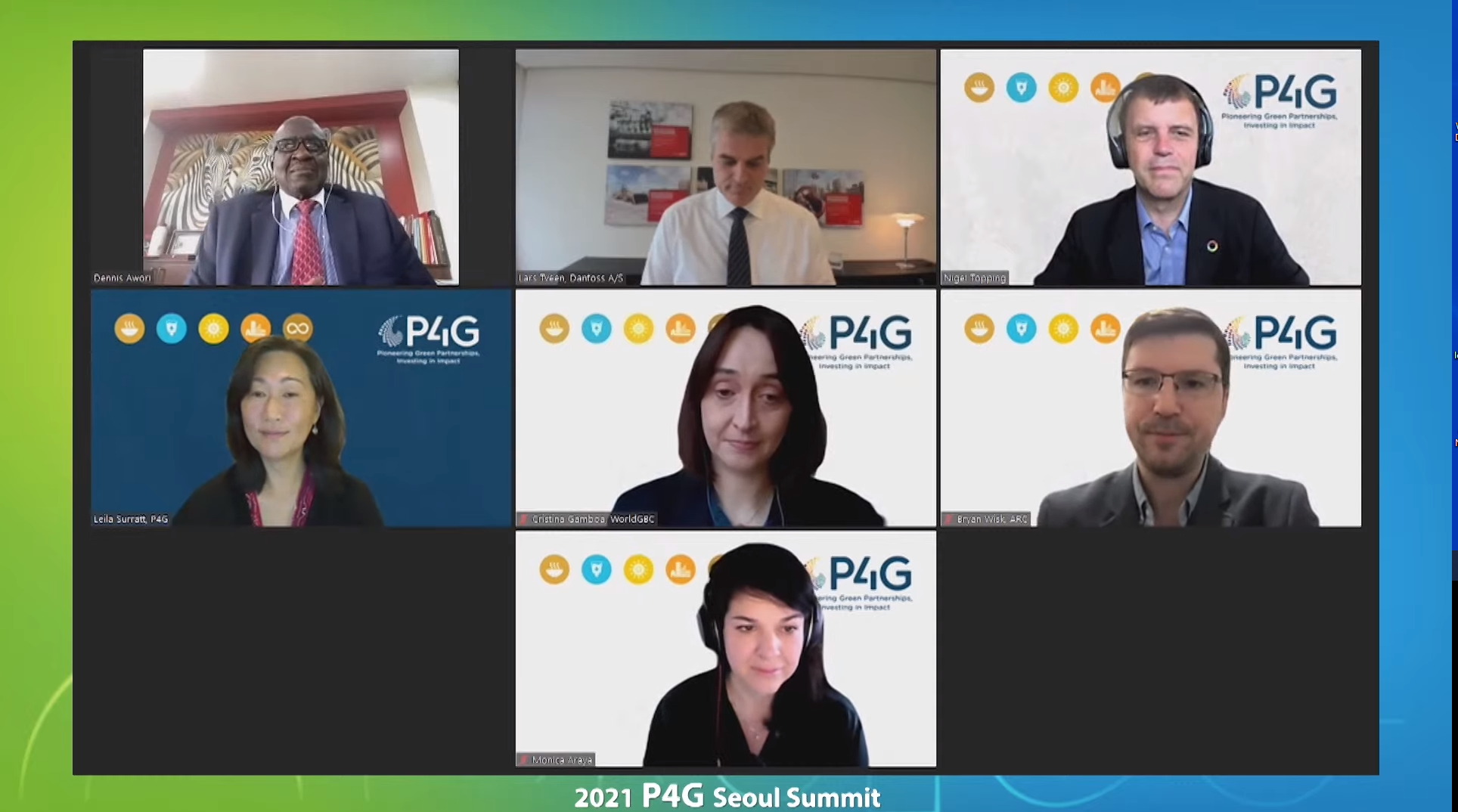E-mobility and Net Zero Buildings Emerge as Solutions to Transform Cities at P4G Summit

Subject
P4G Summit
Country
Publication Date
2021-06-03
About
The opportunity for developing countries to leapfrog to zero emissions was a central theme of the 2021 P4G Seoul Summit Session “Partnership for Smart and Resilient Green Cities.”
Nigel Topping, High Level Champion for Climate Action, COP26, kicked off the discussion with his keynote that underscored the urgency of going from targets to plans to actions. He emphasized the need for innovative and practical partnerships with accessible solutions and mentioned the role of P4G “as a crucial platform for pursuing those kinds of solutions in developing economies that will help us in the lead up and beyond COP26.” Topping, who launched the Race to Zero Campaign in June 2020, shared how P4G’s work complements the campaign’s goals of galvanizing ambitious climate action among cities, regions, businesses and investors – all of whom are expected to declare concrete plans of halving their emissions by 2030.
Sharing the impact of the built environment on emissions and an approach to decarbonization was Cristina Gamboa, CEO, World Green Building Council. Through the work of the Green Building Council, multiple cities in Latin America have enacted key energy efficiency policies to make new builds net zero. Gamboa noted the uptick of cities interested in energy efficient buildings and the role of partnerships in sharing best practices that could speed the process. Since residential structures comprise 70% of new builds, Gamboa highlighted the need to include housing in net zero building policies as well.
Daniel Gomez, Deputy Minister for National Planning, Colombia, rounded out the keynote speeches by sharing Colombia’s commitment to achieving its ambitious Nationally Determined Contributions (NDCs). He called out a few guiding pillars that informed its strategy for a sustainable and resilient economic recovery – infrastructure and sustainable cities, bio-economy, and nature-based solutions. Gomez also mentioned the urban mobility priorities of Colombia - a sector in which P4G works closely with Colombia, accelerating numerous zero emissions transportation partnerships. He wrapped by sharing Colombia’s excitement about hosting the P4G Summit in 2023.
Session moderator, Leila Yim Surrat, Director of Strategy & Engagement at P4G, led the session into a discussion where she asked all panelists to share the innovative solutions they are working on and how P4G could help scale their vision.
Monica Araya, Special Adviser to COP26 Climate Champion Nigel Topping stressed the importance of a clear vision on the end goal of net zero and the need to get there fast. As she pointed out about the Race to Zero, “it’s a race, we’re not walking.” She spoke about smart financing being integral to e-mobility breakthroughs and combining enabling policies with suppliers who commit to producing e-buses and investors who provide the capital. She called on P4G to engage local banking sectors in its partner countries, so financing did not flow to high carbon projects. Ultimately, she said, this is a story of people – drivers, children and people w in the city whose lives will change for the better with these solutions.
Bryan Wisk, Chief Investment Officer, Asymmetric Return Capital (ARC) shared the approach of using finance to come up with a model that has been applied to other asset classes to consolidate the technological risk, lower the cost, and increase the bankability of these solutions. This increases the probability of attracting international capital and standardizing these models. He noted that P4G is instrumental in ensuring that these models get driven nationally with close buy-in at the local and regional levels.
Continuing the e-mobility conversation, Dennis Awori, Chairman, Toyota Kenya, shared Toyota’s goal of getting to net zero in operations and products that complemented Kenya’s commitment to climate action. With the transport sector contributing to 13 – 17% of emissions in Kenya, using e-mobility for public transport and goods movement enables the country to leapfrog from conventional mobility to sustainable alternatives. He shared how Toyota was focusing on 2-3 wheelers, before moving to 4-wheelers and buses and the opportunities this would lead to developing a new industry and expanding an existing one. He urged P4G to continue its work of bringing together different stakeholders from government, private sector and civil society to forge and develop the implementation of net zero plans.
Lars Tveen, President, Developing Regions, Danfoss, picked up the thread started by Cristina Gamboa on the need for energy efficiency in buildings. Buildings are responsible for nearly 40% of direct and indirect CO2 emissions and Danfoss is focused on saving energy and turning energy green. Tveen shared that green and financially attractive propositions can work together, providing an example of a 20-story building in Kuala Lumpur retrofitted with a new cooling system that resulted in 60 – 70% of energy efficiency with a payback time of two years. He spoke of P4G’s role in articulating these solutions and delivering progress at speed. “Energy efficiency is the best job creator,” he said as he highlighted the opportunity for developing countries to be at the forefront of bringing down CO2 emissions in the built environment.
Yim Surratt closed with inspiring remarks that got to the core of the need for sustainable cities – the impact on people as they live, breathe, commute and work in cities. She painted an exciting picture of the way everyone’s lives could be transformed in the next decade through clean vehicles and buildings.
Watch the full session recording here.
